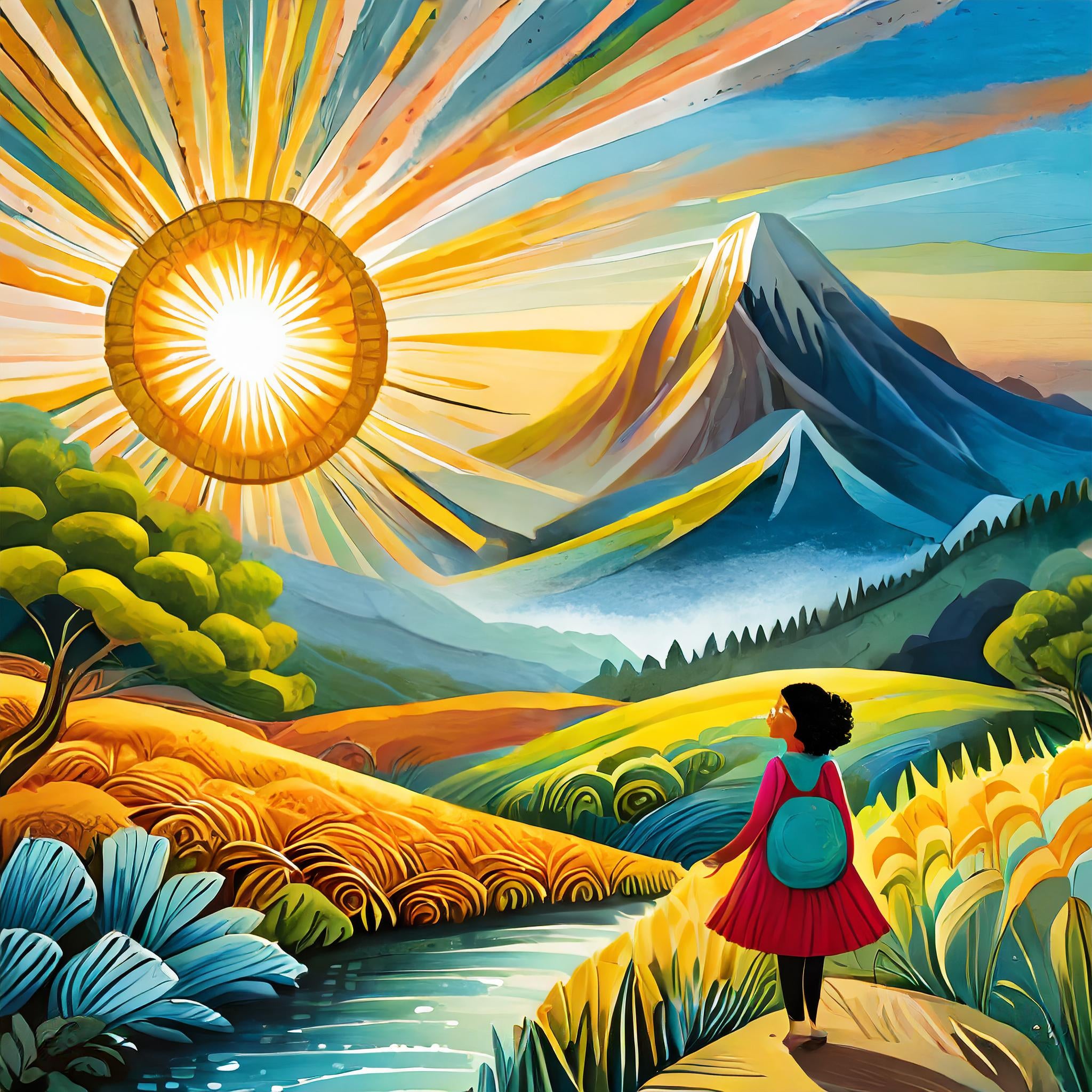
The Path to Enlightenment: How to Awaken Your Spiritual Self
Introduction to Spirituality
Spirituality is a broad concept with room for many perspectives. In general, spirituality refers to the human quest to understand life’s deepest meanings and connect with something larger than ourselves. It involves our search for purpose, morality, happiness, peace, and fulfillment. For many people, spirituality also points to a divine being or higher power.
This introduction covers the definition of spirituality and an overview of topics that will be explored throughout this guide. We’ll look at the history and origins of spiritual traditions, discuss why spirituality matters, and provide tips for developing your own spiritual life. We’ll examine the differences between spirituality and religion, survey the major types of spirituality, and learn about common spiritual experiences. We’ll also consider how spirituality shows up in daily life, its connection to nature, and what the future might hold for humanity’s spiritual journey.
Spirituality means different things to different people. The aim of this guide is not to promote any single worldview, but rather to illuminate the diverse and universal human search for purpose and meaning.
History and Origins of Spirituality
Spirituality traces back thousands of years to some of humanity's earliest beliefs and experiences. Even prehistoric hunter-gatherer groups engaged in spiritual practices linked to nature, rituals, and community identity.
Early agrarian cultures centered their spiritual lives around fertility rituals, harvest festivals, and worship of mother goddess figures representing the cycle of birth, life and death. Spirit beings and animism, the belief that natural entities had souls, were common.
By around 2000 BCE, more formalized polytheistic religions emerged. Systems like the Egyptian and Greek pantheons and Hinduism focused on worshipping multiple gods with unique roles. Rituals and sacrifices were essential to appeasing the gods and avoiding misfortune.
From 500 BCE to 300 CE, new philosophies arose challenging polytheism. Buddhism, Jainism, Daoism and Stoicism emphasized spiritual cultivation over appeasing gods. Compassion, ethics, meditation and nature veneration became focuses.
Monotheistic faiths like Judaism, Christianity and Islam grew to prominence from 300 CE to 1200 CE. Worship concentrated on a single supreme deity, though spiritual traditions like Kabbalah, monasticism and Sufism existed.
From 1500 CE onward, the Enlightenment and exploration led some to question religion’s spiritual monopoly. New schools like Transcendentalism and Theosophy blended Eastern and Western spirituality without formal religions.
Today, spirituality continues expanding beyond traditional faiths. More identify as spiritual but not religious. Holistic spirituality, mindfulness, and personalized spiritual experiences are common modern expressions.

Why Spirituality Matters
In our modern world filled with stress and uncertainty, many are turning to spirituality as an antidote and a means to cultivate inner peace and personal growth. More and more studies reveal the wide-ranging benefits that spiritual beliefs and practices can have for health, happiness, relationships, and overall wellbeing.
At its core, spirituality provides a sense of meaning and purpose to life. It offers a moral framework to guide choices and connects us to something larger than ourselves. For many, spirituality promotes gratitude, compassion, and humility. These traits allow people to cope better with hardship and form meaningful bonds with others.
Research shows that people who consider themselves spiritual or religious tend to experience higher levels of life satisfaction and emotional wellbeing. Spirituality has been linked to better mental health outcomes, including lower rates of anxiety, depression, and suicide. Those exposed to spiritual concepts report less distress, better quality of life, and even improved cardiovascular health.
By reframing challenges and nurturing personal growth, spirituality enables resilience in the face of life's inevitable difficulties. Spiritual practices like meditation and prayer provide rituals to calm the mind and body even during periods of turmoil. For many, faith in a higher power or greater unfolding purpose provides comfort and courage to persist through tough times.
While spirituality takes many forms, nearly all traditions offer practices to help people align with their highest values, transcend their everyday concerns, and experience deep meaning. By promoting virtues like compassion and gratitude while reducing fear and anger, spirituality allows individuals to reach their full potential and lead more enriched, purposeful lives.
Developing Spirituality
Spirituality is an ongoing journey of growth and learning. While some people may have innate spiritual gifts, there are many ways to further explore and strengthen your spirituality.
Setting the intention to enhance your spiritual life is the first step. From there, engaging in spiritual practices can help you tap into a deeper sense of purpose and inner peace.
Spiritual Practices
There are many time-tested practices that are designed to cultivate spiritual development. Some of the most common and accessible practices include:
- Meditation - Quieting the mind and focusing inward to increase awareness.
- Prayer - Communicating with the divine however you perceive it.
- Reading spiritual texts - Gleaning wisdom from sacred books or inspirational literature.
- Being in nature - Experiencing serenity and connection through time outdoors.
- Practicing gratitude - Giving thanks and appreciating life's gifts.
- Simplifying life - Letting go of excess possessions and distractions to focus on meaning.
- Serving others - Contributing good deeds and acts of service.
- Chanting or singing - Uplifting the spirit through song, rhythm and repetition of mantras.
There are also many more esoteric or rigorous spiritual practices ranging from fasting and asceticism to mystical rituals. The key is finding a practice or set of practices that resonate with your beliefs and lifestyle.
A dedication to spiritual practices allows you to move beyond surface-level priorities and connect to deeper sources of truth within yourself.
Spirituality vs Religion: Commonalities and Key Differences
Spirituality and religion are related concepts, but have some key differences. Religion typically involves an organized set of beliefs, rituals, and practices related to the sacred or divine. It often includes belief in and worship of a higher power. Spirituality relates more to a person's subjective inner experience of meaning, purpose, inner peace, and connection to something bigger than themselves.
While spirituality does not have to be tied to an organized religion, for some individuals their spiritual experiences and growth are intimately connected to their religious faith. Others pursue spirituality through personal reflection, meditation, appreciation of nature, or other practices unrelated to a specific religion.
There is much overlap between spirituality and religion for those involved in faith traditions. Religions often aim to foster spiritual growth. Spiritual practices like meditation and prayer are part of many religions. However, religion is focused more on outward expression through specific behaviors and rituals, while spirituality emphasizes internal, subjective experiences of meaning.
Overall, spirituality relates to an individual journey of growing self-awareness, finding meaning and purpose, and connecting to something larger than one's self. Religion may facilitate and support that journey, but spirituality can also develop outside of an organized religious context.
Types of Spirituality
There are many forms that spirituality can take. The two main categories are religious spirituality and secular spirituality.
Religious spirituality involves connecting to the divine through an established faith tradition like Christianity, Judaism, Islam, Hinduism or Buddhism. This type of spirituality uses the texts, rituals, prayers and community of an organized religion to deepen one's inner life and connect to God or a higher power.
In contrast, secular spirituality does not depend on a religious doctrine. It focuses on finding meaning and inner peace through personal reflection, contemplation of nature, meditation, yoga, helping others and exploring philosophical questions about existence without reference to a deity. Secular spirituality emphasizes the human spirit and living with integrity.
While religious and secular spirituality have different approaches, both recognize that there is more to life than the material day-to-day. They provide paths to find deeper meaning and purpose, experience transcendence, and connect to something larger than oneself.
Some examples of spiritual paths include:
- Christian mysticism
- Sufism in Islam
- Kabbalah in Judaism
- Bhakti yoga in Hinduism
- Zen Buddhism
- Transcendental meditation
- Humanism
- Mindfulness practices
- Connection with nature
While the approaches are diverse, all these paths have the shared goal of nurturing the human spirit through inner work, self-reflection and practices to expand awareness and connection.
Experiencing Spirituality
Spiritual experiences vary widely, but often share a sense of connection and meaningfulness that transcends our everyday lives. Meditation, prayer, psychedelics, and time in nature can trigger these mystical states, described as feelings of oneness, timelessness, boundless love, and profound insight into the nature of existence.
These experiences go beyond intellect or emotion - there is a deeper sense of knowing and certainty. While transient, the effects can leave lasting positive changes on personality, life outlook, and behavior. Studies show participants who have had spiritual experiences exhibit more openness, wisdom, imagination, and creativity long after the event.
The immensity and ineffability of spiritual states has led some to call them “true mysticism.” While challenging to convey in words, when one is lifted from the mundane and catches a glimpse of transcendent reality, it instills a sense of purpose and meaning. For many, it fundamentally alters one’s worldview.
Seeking these peak experiences is central to many spiritual traditions, though they cannot be controlled. But the potential for personal growth and transformation means the journey lies not in reproducing an experience, but integrating its essence into daily living.

Spirituality in Daily Life
Spirituality is not just reserved for special retreats or designated prayer times - it can be integrated into daily life to provide a sense of purpose and meaning. From incorporating mindfulness into mundane tasks to performing small acts of service, there are many ways to infuse ordinary routines with an extraordinary awareness of oneness with all of life.
Setting the intention to live more mindfully is the first step. Pay close attention to sights, sounds, thoughts and feelings throughout your day. Notice the sacredness in ordinary moments like preparing a meal, driving to work or taking out the trash. Completing household chores with care and focus can become a meditative practice.
Bring more mindfulness to interactions with others too. Make eye contact, truly listen and offer your full presence. See the inherent worth in every human being by looking beyond superficial differences to find the goodness within. Perform small acts of kindness, even just holding the door for someone, and recognize we are all connected.
Infuse work and school with greater purpose, serving as an instrument of compassion. Offer encouragement to coworkers and classmates, volunteer for extra tasks, and deliver your best effort. Reflect on how your gifts and skills, however small, contribute to the greater whole.
Allow spirituality to guide decision making, discerning the choices that foster peace versus turmoil, unity versus division. Evaluate how to live with more simplicity and less need for material things. When faced with difficulties, respond with understanding.
By carrying this mindful presence throughout all aspects of life, every moment takes on new meaning. The mundane becomes sacred, and ordinary life provides endless opportunities to grow in wisdom, service and connection to all of creation.
Spiritual Connection Through Nature
For many people, connecting with nature is a profound spiritual experience. Nature has a way of bringing us into the present moment and evoking a sense of awe. Spending time outdoors reminds us of our place in the larger web of life.
Trees, rivers, mountains, and sunsets can be gateways to spiritual connection. The beauty and power of nature helps put our human concerns into perspective. A walk in the woods or by the ocean brings inner peace. Looking up at the vast night sky makes our problems feel small.
Being in nature seems to unlock our spiritual capacity for wonder, gratitude, and humility. The rhythms of nature reflect deeper universal patterns. Seeing this interconnectedness can lead to spiritual insight.
Many spiritual teachers throughout history have pointed to the importance of nature in nourishing the soul. They encourage going into the wilderness, gardening, and contemplating the natural world.
For some, this manifests as environmentalism or pursuing outdoor adventures to push their limits. But nature's ability to uplift goes beyond recreation. Even observing the leaves, clouds, and critters in our backyard can center us.
As our world urbanizes and technology immerses us, time in nature becomes even more precious. Seeking out mountains, beaches, parks, and simple gardens keeps us tethered to our spiritual source.
The Future of Spirituality
Spirituality will likely continue to evolve along with cultural changes and an increasingly globalized and secular world. However, the search for meaning, purpose, and connection that spirituality provides will remain relevant.
Interest in more individualized forms of spirituality not tied to organized religion may continue to grow. People are seeking spiritual practices like meditation, mindfulness, and yoga that can be done outside of traditional religious structures.
The divide between religion and spirituality could widen further as more people identify as spiritual but not religious. This points to a desire for personal exploration of existential questions without adhering to doctrine or dogma.
At the same time, the dialogue between science and spirituality will likely deepen. Research on meditation and consciousness is giving new insights into spiritual experiences and what it means to be human. This knowledge could allow people to approach spirituality in more grounded ways.
Finding community and meaning in causes larger than oneself may take on more spiritual significance. With climate change and other global issues, people may increasingly view Activism as giving them a sense of purpose.
Overall, spirituality will remain vital as we continue seeking meaningful connection to self, others, nature, and the divine. Though its forms keep changing, the human quest for purpose endures.
Recommended reading:
"The Power of Now" by Eckhart Tolle: This book explores the concept of being present and living in the moment, offering insights on finding peace and enlightenment.
"The Alchemist" by Paulo Coelho: A captivating story that follows a shepherd on his journey towards self-discovery and spiritual awakening, teaching valuable lessons about life and following one's dreams.
"A New Earth" by Eckhart Tolle: Tolle presents ideas and practices that help individuals overcome ego-based thinking and guide them towards spiritual growth and awakening.
"The Celestine Prophecy" by James Redfield: A gripping adventure that combines spirituality and mysticism, taking readers on a quest for understanding the deeper meaning of life and human relationships.
"Man's Search for Meaning" by Viktor E. Frankl: This inspiring book recounts Frankl's experiences as a prisoner in Auschwitz and delves into the question of finding meaning in life, even in the midst of suffering.
"Siddhartha" by Hermann Hesse: A novel that follows the journey of Siddhartha, a man who embarks on a path of self-discovery and spiritual enlightenment, exploring Eastern philosophy and teachings.
"The Prophet" by Kahlil Gibran: A timeless classic, this book offers poetic and profound insights on various aspects of life, including love, joy, pain, and self-identity, leaving readers with valuable wisdom for their spiritual journey.
"Autobiography of a Yogi" by Paramahansa Yogananda: Yogananda presents his spiriParamahansay and teachings, including yogic practices, meditation, and his encounters with several spiritual masters, offering a glimpse into the Indian yogic tradition.
"The Book of Awakening" by Mark Nepo: This daily guide offers meditative essays and reflections meant to inspire and provide spiritual nourishment, helping readers find peace, joy, and authenticity in their lives.
"The Untethered Soul" by Michael A. Singer: This transformative book explores the concept of self-awareness and delves into the nature of the mind, emotions, and consciousness. Singer provides practical insights and guidance on developing inner peace, letting go of limiting beliefs, and freeing oneself from negative thoughts and emotions. With clarity and depth, "The Untethered Soul" offers a profound understanding of the spiritual journey and the path to self-realization. Through its clear and accessible teachings, readers can gain valuable tools to transcend the limitations of the ego and discover a greater sense of freedom and inner fulfillment.
"The Seven Spiritual Laws of Success" by Deepak Chopra: A concise guide to achieving success through spiritual principles, this book presents practical steps to align with the laws of the universe and manifest abundance, fulfillment, and well-being.
"The Four Agreements" by Don Miguel Ruiz: This insightful book introduces four guiding principles based on ancient Toltec wisdom, emphasizing the importance of integrity, authenticity, and the power of our words in creating a meaningful and harmonious life.
"Big Magic" by Elizabeth Gilbert: Gilbert explores the creative process and encourages readers to embrace their innate creativity. This uplifting book inspires individuals to live a more liberated and fulfilling life by actively pursuing their passions.
"The Power of Positive Thinking" by Norman Vincent Peale: A timeless classic, this book teaches readers how to harness the power of positive thinking to overcome challenges, build resilience, and achieve personal and spiritual growth.
"The Seat of the Soul" by Gary Zukav: Zukav examines the connection between spirituality and personal evolution, discussing topics such as intuition, karma, and universal energy. This book offers deep insights into the soul's journey and purpose.
"The Road Less Traveled" by M. Scott Peck: Combining psychology and spirituality, Peck explores topics like self-discovery, love, and personal growth. This insightful book encourages readers to embrace self-discipline and take the path of growth and spiritual maturity.
"You Can Heal Your Life" by Louise Hay: Hay introduces the idea of mind-body connection and explores how our thoughts and beliefs impact our health and well-being. This empowering book provides practical techniques for self-healing and personal transformation.
"The Surrender Experiment" by Michael A. Singer: Singer shares his personal story of surrendering to life's flow, letting go of control, and embracing what arises. This book offers profound lessons on trust, surrender, and living in alignment with the present moment.
Please note that book preferences can vary, so it's always helpful to read reviews, check descriptions, and see which books resonate with your particular interests and beliefs before selecting one to read.



Leave a comment
This site is protected by hCaptcha and the hCaptcha Privacy Policy and Terms of Service apply.